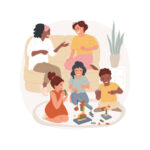As autumn sets in and winter approaches, so do the seasonal allergies, posing challenges for single moms striving to maintain their kids’ well-being. With expert-backed strategies, you can navigate seasonal allergies and ensure your children stay healthy throughout the year.
Understanding Fall Allergies
Fall allergies often arise due to triggers like ragweed pollen, mold spores, and dust mites. These allergens can cause symptoms such as sneezing, runny nose, itchy eyes, and worsen asthma in children.
Expert Tips for Single Moms
1. Monitor Pollen Counts
Stay updated on local pollen forecasts, available through weather websites or apps. When pollen levels are high, keep windows closed and use air conditioning to filter the indoor air.
2. Outdoor Precautions
Encourage kids to wear hats and sunglasses when playing outside to shield their eyes from allergens. After outdoor activities, have them change clothes and wash their face and hands to remove allergens.
3. Allergy-Proof Home
Utilize allergen-proof covers on mattresses and pillows to reduce exposure to dust mites. Frequent vacuuming with a HEPA filter can help remove indoor allergens.
4. Medication Guidance
Consult a pediatrician or allergist for appropriate allergy medications for your child. Antihistamines, nasal sprays, or other prescribed medications can alleviate symptoms when used as directed.
5. Healthy Diet and Hydration
Encourage a balanced diet rich in fruits and vegetables to support immune health. Adequate hydration helps keep nasal passages moist, reducing irritation.
6. Regular Cleaning Routines
Implement a consistent cleaning schedule to reduce allergens at home. Focus on dusting surfaces, vacuuming carpets, and cleaning curtains or blinds regularly to minimize indoor allergens.
7. Shower After Outdoor Activities
Encourage children to shower or bathe after spending time outdoors, especially during high pollen seasons. This helps remove pollen and allergens from their skin and hair, preventing them from spreading around the house.
8. Allergy-Friendly Landscaping
Consider planting hypoallergenic flowers and plants in your garden or yard to minimize outdoor allergens. Avoid highly allergenic plants like ragweed and opt for low-pollen varieties instead.
9. Limit Outdoor Activities During Peak Allergy Hours
Try to schedule outdoor activities for times when pollen counts are lower, typically in the late afternoon or after a heavy rain when allergens have settled.
10. Consider Allergy Testing
For children with persistent or severe allergy symptoms, consider consulting an allergist for allergy testing. Identifying specific allergens can help develop a targeted treatment plan.
Fall allergies can be managed effectively by implementing these expert-advised strategies. Always consult healthcare professionals or allergists for personalized advice tailored to your child’s specific health needs.
By staying proactive and informed, single moms can ensure their children enjoy the beauty of the fall season without the inconvenience of pesky allergy symptoms.



